On 17 January 2018, I stopped drinking. Not because I was being pressured to. Not because I didn’t know my limit. Not because alcohol was ravaging my life. I gave it up because, like Oprah Winfrey, I had an ‘aha’ moment. Reading Winfrey’s The Wisdom of Sundays and Russ Perry’s The Sober Entrepreneur created so many aha moments that I thought I was going to suffer some type of breakdown. I couldn’t keep up with the big life questions being thrown at me. Then I ended up frustrated because I couldn’t hear the answers.
Let me be honest. I wasn’t open to hearing the answer to this one question: Was I happy where I was in life? No.
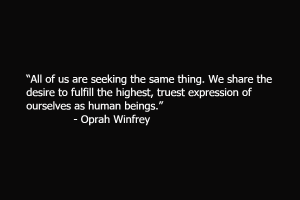 It thundered from all sides, cut through to my core. No, I wasn’t ‘happy’ with my life because I wasn’t where I wanted to be or living the life I’d imagined for myself. And if I wanted to bring that vision to life, I had to make changes. Otherwise, I’d end up stranded and not doing much of anything when what I really wanted was to be the best version of myself. Or, as Winfrey writes: “All of us are seeking the same thing. We share the desire to fulfill the highest, truest expression of ourselves as human beings.”[note]The Wisdom of Sundays by Oprah Winfrey, Flatiron Books, p. 8.[/note]
It thundered from all sides, cut through to my core. No, I wasn’t ‘happy’ with my life because I wasn’t where I wanted to be or living the life I’d imagined for myself. And if I wanted to bring that vision to life, I had to make changes. Otherwise, I’d end up stranded and not doing much of anything when what I really wanted was to be the best version of myself. Or, as Winfrey writes: “All of us are seeking the same thing. We share the desire to fulfill the highest, truest expression of ourselves as human beings.”[note]The Wisdom of Sundays by Oprah Winfrey, Flatiron Books, p. 8.[/note]
Let me backtrack a little. I am happy and I’m living a pretty good life. I have a loving partner, and good friends who support, encourage and believe in me. I’m blessed with a place to lay my head at night and good health. And for all those things, I am grateful.
I want to go back for a moment to what Winfrey said: “[…] fulfill the highest, truest expression of ourselves as human beings.” That’s what I’m seeking, what I’m attempting to do through my writing. Whether it’s my blog, my #TwitFicTues or Friday Fiction series, or my novels … writing is my way of communicating with the world.
Writing is one of the most joyful acts I perform each day and the first thing I do each morning. Beyond that joy, writing is a way (for me as an introvert) of connecting to a world I often feel at odds with. It keeps me grounded. So, when I veer off course — lose focus — it can be disastrous. Suddenly, everything is under fire. Then I have to find a way to hold it all together and get back on track.
The Devil Known As ‘Procrastination’
Procrastination is my nemesis. It’s always peeking over my shoulder when I look at my daily to-do list. I like to think I’m superhuman and that I can work nonstop from the time I plant my feet on the floor to when my head crashes on the pillow. On any given day, there are seven to ten tasks on my to-do list. These aren’t ‘simple’ tasks like ‘Do a load of laundry’ or ‘Thaw the chicken for dinner.’ No, my to-do looks like this:
- Run 10k
- Write next week’s Twitter Fiction installment
- Edit two chapters from manuscript (I have two book projects on the go)
- Write blog post
- Revise Flash Fiction Story
- Social Media Engagement
- Book Promotion and Marketing
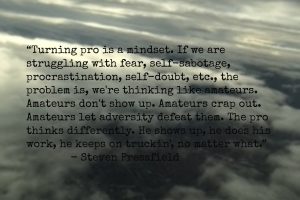 My head starts to spin because I foolishly believe that I can do it all — and do them all well — in one day. At some point, I feel my chest tighten because I know I can’t do it all, but I want to. That’s when I say to myself, “Oh, let me just check in quickly on Twitter.” Next thing I know, I’ve lost an hour. Or I say, “Watch one episode of The Brave” (I have a bit of a man-crush on Mike Vogel). Three episodes later, the TV’s still on. One distraction leads to another, and then I end up procrastinating the day away.
My head starts to spin because I foolishly believe that I can do it all — and do them all well — in one day. At some point, I feel my chest tighten because I know I can’t do it all, but I want to. That’s when I say to myself, “Oh, let me just check in quickly on Twitter.” Next thing I know, I’ve lost an hour. Or I say, “Watch one episode of The Brave” (I have a bit of a man-crush on Mike Vogel). Three episodes later, the TV’s still on. One distraction leads to another, and then I end up procrastinating the day away.
What does this have to do with going sober?
If I want to embrace that ‘truest expression’ of myself, I must look at what I’m doing and how I’m doing it. How can I be more productive? How can I stay focused? How can I be the person I want to be?
Going and Staying Sober
I want to be of service. I believe that God — the Universe — is trying to use me as I am, with what I have, and for a good greater than myself. For the past two years or so, life was speaking to me, but I wasn’t listening. I was always, it seemed, in my doctor’s office. One visit I wanted to know why I wasn’t just sick but still sick. The next I was complaining of fatigue. Then the next I needed relief from the long bouts of insomnia. A large part of that was due to my day job as I was (still am) constantly jetting between time zones.
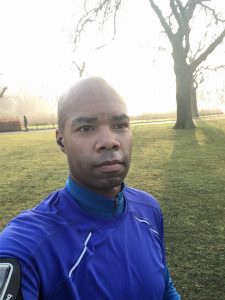
Lately, London (UK) has been my home away from home. On the mornings I’m there, I run through Regent’s Park. I grab a latte and lunch at Gail’s Bakery on Seymour Place. I have an Oyster card to get around the city on the Tube. But when I return to Toronto, my circadian rhythm is thrown into chaos.
It’s hard to focus and be productive when I haven’t had a good night’s sleep. After I gave up coffee (and most caffeinated products) in October 2016, I started paying better attention to my energy levels. While I may have only had a glass or two of wine with dinner, I noticed that on the following day my energy level was much lower. It took me longer to get moving in the morning and feel alert. And when I didn’t have much energy, it was again much easier to give myself over to procrastination. Giving up alcohol has, again, improved my energy levels, as well as my focus and productivity.
Fifty-two days (and counting) sober, I’m writing more because I’m honoring my commitment to creating the life I want. I have more energy. I’m still making crazy to-do lists, but it feels like I’m getting through more of the tasks. Like saying no to a drink, I say no to the TV and turn it off when my partner leaves for work. No more, “I’ll do it in an hour,” and that means getting my run in the morning, right after I’ve completed my Morning Pages. When I didn’t think I had the time, or interest, for blogging, I’m showing up and doing it regularly. And enjoying it! It’s like I’m living in a state of grace.
It’s the Why that Keeps Me Going
Staying sober for me is not just about having more energy or increasing my productivity. It’s a state of being that helps me feel fulfilled by being of service, and allows me to contribute my community and the world. Ultimately, it gives me the greatest chance of living my best life. That’s why I chose sobriety.
Sober, I stand a better chance of achieving my dreams. Sober, the world will see the truest expression of who I am.
How do you stay focused? How are you living your best life? How are you being of service? Take a moment and let me know in the comments section below.
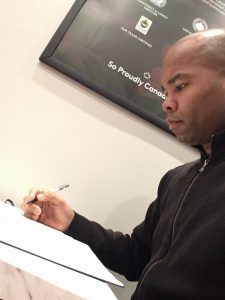 Let me back up a moment. I didn’t always know that I wanted to be a writer. That’s because I kept running away from who I really was.
Let me back up a moment. I didn’t always know that I wanted to be a writer. That’s because I kept running away from who I really was.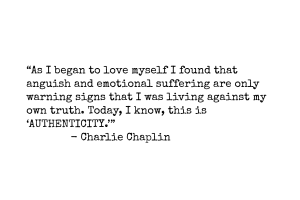 But it was, at twenty-two, when I accepted that I was gay — and more than telling my friends and family a year later — that I’d been set free. That was when I began to love myself. In the most important of ways, I had found my footing. And looking back over the years, I can see that through my writing I’ve tried to be of service by helping people get to that other side of forgiveness. That place where we [I] can forgive ourselves [myself] and each other for the past that was, moving along conscious and alive in the present moment.
But it was, at twenty-two, when I accepted that I was gay — and more than telling my friends and family a year later — that I’d been set free. That was when I began to love myself. In the most important of ways, I had found my footing. And looking back over the years, I can see that through my writing I’ve tried to be of service by helping people get to that other side of forgiveness. That place where we [I] can forgive ourselves [myself] and each other for the past that was, moving along conscious and alive in the present moment.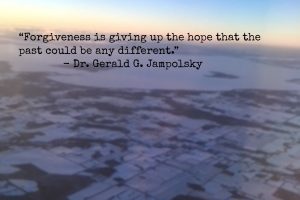 I write for a lot of reasons. Mainly, I like to explore, through the lens of a personal story, the aspirations of the individual against those of the collective. I hope to challenge the reader’s, as well as my own, belief system. It’s not just about asking, for example, “What are we doing here?” but also “How did we get where we are?” and “Could we get here another way?”
I write for a lot of reasons. Mainly, I like to explore, through the lens of a personal story, the aspirations of the individual against those of the collective. I hope to challenge the reader’s, as well as my own, belief system. It’s not just about asking, for example, “What are we doing here?” but also “How did we get where we are?” and “Could we get here another way?”